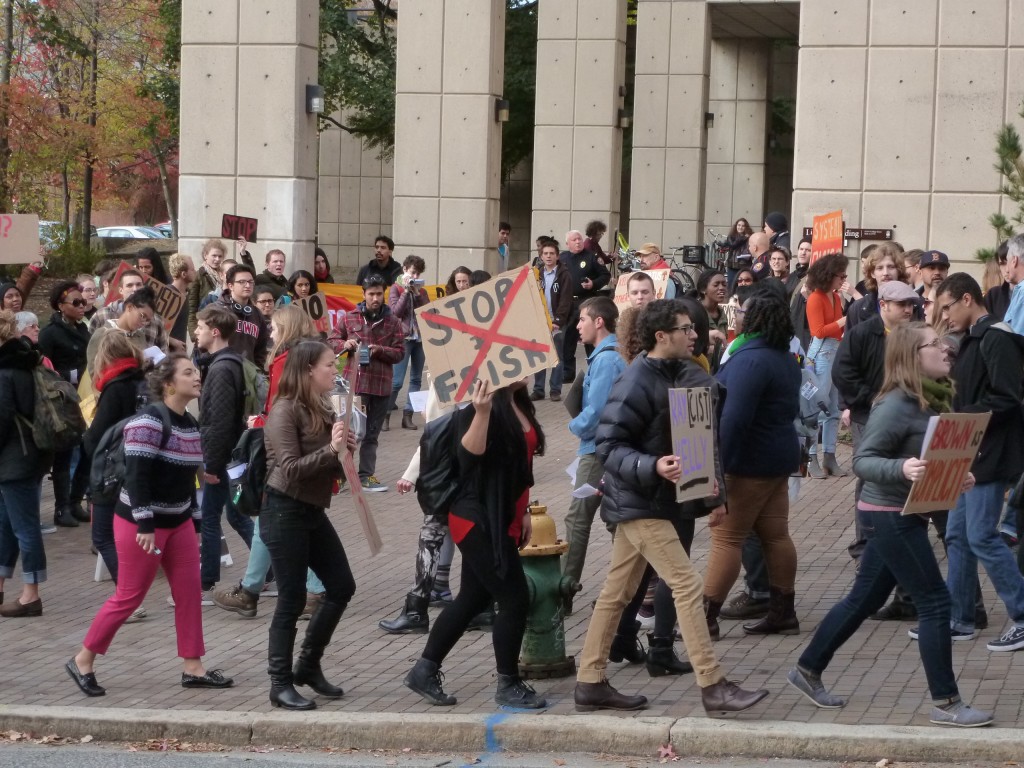By Hassan Hamade
Though former New York City Police Commissioner Raymond Kelly had been invited to give the Noah Krieger ’93 Memorial Lecture in October 2013, the reception that awaited him in Providence was anything but inviting. On the day of the speech, students and community members picketed List Art Center — the venue for the address — and proceeded to shout down Ray Kelly during his speech. These disruptions eventually resulted in the cancelling of the lecture. According to Jenny Li ’14, one of the main organizers of the protest, the students had “won out.”
Kelly’s unpopularity was in large part due to his status as the public face of the controversial stop-and-frisk policy in use in New York City. A poll conducted by the Brown Daily Herald revealed that some 78 percent of students were opposed to the policy. The buildup to the lecture was marked by growing opposition to Kelly, which took the form of a petition — eventually signed by around 500 students, alumni and community members. Despite this relatively substantial opposition, Kelly’s speech was greenlit by the administration.

The days after the speech saw much discussion of the protest, as students debated both the policy behind Kelly’s notoriety and the manner in which his lecture had been halted. The tensions continue between those who deferred to free speech, regardless of that speech’s content, and those who wanted to silence the architect of a discriminatory policy.
The tableau of objecting students and objectionable speakers is hardly new to Brown. Student reactions to these speakers, however, are more disparate. In November 1984, an ominous year for any government agency, the CIA sent representatives to Brown to recruit potential employees at the university. At the time, the CIA had drawn criticism for providing funds to overthrow the government of Nicaragua, launching paramilitary covert campaigns in non-hostile states and other abuses. Consequently, the agency had become unpopular among Brown’s largely liberal student body.
During the CIA’s presentation, a student in the audience blew a police whistle, and 60 students stood up to declare a citizens’ arrest “for solicitation to aid in the violation of national and international law.” Former student Juliet M. Brodie, a leader of the protest, claimed that such an action was a “carefully thought-out effort to combat what we believe to be criminal activity.”
The protestors viewed the citizens’ arrest as appropriate and in line with the Student Code of Conduct. And unlike the Ray Kelly protest, many in the student body felt empowered by this effort. Although there were severe consequences for such actions — including suspensions and permanent record listings — campus support was so strong that 800 students attended the disciplinary trials. Students were fiercely proud that the organization perceived by some to be responsible for policing the world, was itself being policed.
The CIA event presented a largely similar set of circumstances to the Ray Kelly protest. Yet, curiously enough, the former saw broad support across the student body, and the latter provoked a split reaction, despite the overwhelming majority of people that continue to oppose the policy Ray Kelly symbolizes. This suggests less a decline in student activism and more a shifting student attitude towards what legitimate protest is. What is unchanging, however, is the willingness of Brown students to take bold action — regardless of perception — when faced with injustice.
